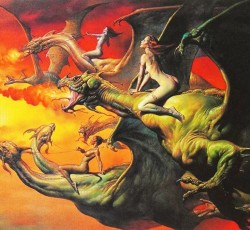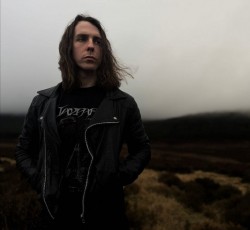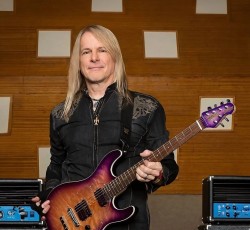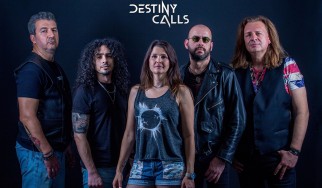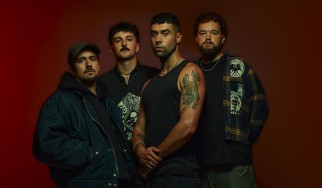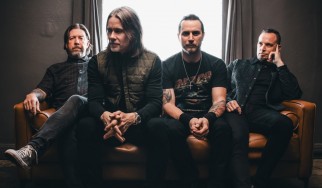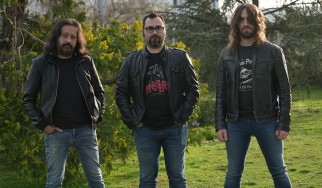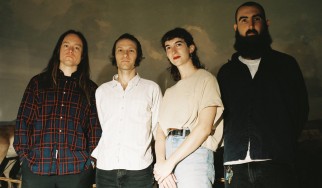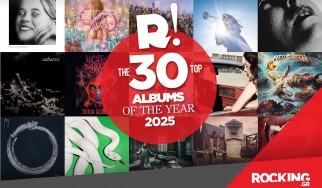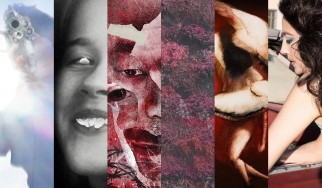Joe Satriani: "Sales reports and awards not a measure of success. An artistic challenge is!"
The iconic guitarists talked to us about the SATCHVAI band, his relationship with Steve Vai and what an artist should consider as success
I am quite sure that anyone who’s ever played an electric guitar or even has been just a fan of electric guitar, not only knows who Joe Satriani is, but recognizes him as one of the greatest and most influential guitarists of all time. With an amazing solo discography and numerous great collaboration, now with his long-time friend Steve Vai, they’ve formed SATCHVAI and they’re once again pushing the envelopes regarding guitar playing and they’re touring Europe offering a unique show.
We had the chance to chat with Joe and learn everything about this new project: how it started, the making of the new album and how the songs sound, how they picked the songs they play live and the musicians that will accompany him and Steve on stage. And, of course, we talked about his unique relationship with Steve, and the way it started back in 1971…
But, also, we covered a few other topics, regarding the evolution of guitar playing over the years, the 90s music and how it affected the traditional guitar playing in rock music, the crucial role of G3, how much has internet affected the quality of music coming from new guitarists and what should be the measure of success for an artist. We can read about all of the above and much more in a very interesting and inspiring interview, that comes as a proof of how great and unique Joe Satriani is both as a musician and as a person.

Hello Joe. How are you?
Very good. Thank you.
First of all, even though it was yesterday, I want to wish you a happy birthday. All the best for you.
Thank you. Thank you very much!
So, how is touring with the SATCHVAI band going so far?
It's great! We have been getting better and better at this show that has been so unique right from the start. Taking the stage together and playing songs that we've written together and playing on each other, songs that we've never done before in front of an audience. So, it's been great! And with the new band, it's just really been fantastic.
Sounds great! And, you know, it's been too long. It's been 18 years since you last played in Greece. So how do you feel about your return here in about ten days from now?
Oh, boy! Finally! We had such a great time, last time we were there and I don't know why it took so long to get back. But, I'm glad it's finally happening.
Yeah, we too are very happy about it. As far as I'm concerned, you've always been great friends with Steve Vai. But how come you decided to form this union? What sparkled the idea and what made you take this decision?
It really started back when we were doing G3, with Steve and Eric [editor: Johnson] and Eric couldn't continue, because he had already booked the rest of the year. Steve and I decided to continue to go out on our own and we thought we'd record a song to sort of go along with the beginning of the tour. And after a while, we decided we should just keep recording as many songs as possible to make an album. Then the idea of touring together in this unique setting came about. So it was a very organic creative process.
Some of the stuff is the most adventurous music we've ever tried to do. We've been pushing each other into areas stylistically that we haven't played before
That's nice. You mentioned that you intended to making an album. If I am not mistaken you're in the middle of the process of recording and making this first SATCHVAI album. So how's it going and how does it sound?
It's really crazy. Some of the stuff is the most adventurous music we've ever tried to do. We've been pushing each other into areas stylistically that we haven't played before, which is really great because it just stretches our creativity together. We're about halfway through, maybe a little more. We have more than enough songs already that we've written. We're just trying to find the time to record everything. But, I believe it will be finished by the end of the year and ready to be released in the first quarter of next year.
It's always good to keep pushing the envelopes
That sounds perfect! Because, hearing you say that it's quite adventurous, and since we're talking about you and Steve, that's quite a statement. You've been adventurous your whole career, so…
Why stop now? It's always good to keep pushing the envelopes.
You have one track out already that included Glenn Hughes on vocals. I don't know if it's going to be on the album, but I'd like to know how you decided to have Glenn for this first track and also if you're planning to have multiple singers on the album or maybe lean more on the instrumental side of yours.
I'm not really sure. I mean, we're not finished with the writing entirely. So, there might be another vocal track. When I started writing the song, "I Wanna Play My Guitar", I hadn't really thought about who would sing it. And then we were doing a Monsters Of Rock cruise, and both Glenn Hughes and The Darkness were on that tour, so I got to see Justin and Glenn perform. They're both just outrageous vocalists and performers, and I actually had the idea that they would both sing on it. But as it turned out, Glenn was really the one that connected with the song the most and had the time to spend, to record it. So he really made it his own. And we gave him a lot of room to pick and choose the lyrics that Steve and I had written and had to come up with his own version of it and… wow, what an amazing performance he gave on that song...

He seems ageless….
Yeah, his vocals are just beautiful. In the studio that day he sang for maybe five hours and everything he sang was perfect!
That’s great to hear. So, coming to the current tour, you've been playing a mix of new songs that you composed together and some songs from both your solo careers. So, I'd like to know how you approach the latter ones. I'm really curious to know if you jam over Steve's songs and he jams over your songs. Or you try not to interfere too much with each other's compositions on stage?
That's a really good question that we had to grapple with. What we did is we took some songs where we each gave each other direction and how we thought the collaboration would work best on stage, and then we had some other songs where it was more of a concert party kind of atmosphere, where we would allow the guests, so to speak, to have carte blanche of do what they want with the song. And so we wind up picking a number of songs in for both categories, so that it wasn't the same throughout the whole night. So on some songs the other guitar players is being very supportive and then other times they're the superstar guest on the song.
It’s gonna be nice to experience it. You also play some cover songs. And I was curious why you picked "Enter Sandman"…
(laughs)
We started doing "Enter Sandman" on the tour last year and the audience responded immediately to it. I mean, every audience we played for, everyone would start singing it. And we knew that we had picked the right song
I mean, you could play literally anything, so why a Metallica tune? What made you do it?
That's funny how that turned out. When we're doing G3 tours and when we're doing the SATCHVAI tour, we generally like to just pick songs that are not connected to our catalogs and we like to pick songs that we think everybody knows and that are flexible for interpretation. And, especially, let's say if you're doing a Metallica song there's no way to replace James Hetfield in his special way of singing, but the song still sounds great with almost any vocal approach to it, because it's a really good song. So, we look for songs like that. That allow for unique interpretation depending on who the vocalist is. And in our band at the time was my keyboardist Ray Thistlethwaite, an Australian musician who has got an amazing singing voice. Nothing like James Hetfield, but still an amazing vocalist. And we were just trading the craziest ideas for vocals. One afternoon we were texting each other and it came to my mind that it would be the most different thing for Ray to try to sing and he loved the idea, because he loves the song and he loves the band. He knew that he couldn't sound like James, but he thought he could bring something unique to it. So, we started doing it on the tour last year and the audience responded immediately to it. I mean, every audience we played for, everyone would start singing it. And we knew that we had picked the right song. It was just a unique song. And so now, with the Marco Mendoza in the band, his vocal style is more like James Hetfield. So, it's really cool that we get to do that still. And we decided to also bring along "Born To Be Wild", which is really a song from my youth. Again, a song that still is relevant today, for some reason. It's just one of those timeless songs.
Right! Now I was wondering, have you ever tried to play the Hydra? If yes, how does it feel? Because it's such a different beast of an instrument…
You know what? I haven't even touched it!
(laughs)
I mean, I'm around it every single day, but I'm afraid that if I touch it, I may hit a switch and it'll throw something off, because Steven and his tech, Doug, they have a very unique routine to make sure that instrument is perfectly set up. And it's a very difficult performance for Steve. So, I generally don't want to get in the way of disturbing that.

I guess you had many choices in your hands and every musician would like and would be fascinated to join the SATCHVAI band. So what he led you to pick Kenny Aronoff, Peter Thorn and Marco Mendoza for the lineup of this touring band.
Kenny Aronoff, in just a world class drummer. Super Pro, great personality and he can really tackle all kinds of styles. From the outside looking in, it may not look that difficult, but the differences between my music and Steve’s are really remarkable in the style of play and it requires a really professional discipline to be able to switch from back and forth within one show. Steve and I both couldn't think of anybody better to fill that role than Kenny Aronoff. I've been playing with him since… Wow, more than 15 years ago, back with Chickenfoot. We've done two or three albums together, and it's a great relationship that we have on stage and off.
Marko Mendoza was recommended to me by a friend and I knew of his performances with a number of bands and most recently with my friend Neal Schon. That one was perfect because I was looking for a bass player that could play rock, could also play Steve Vai’s progressive style of music, but could also really sing rock. And that was a very important thing. And it's really hard to find all that in one package. But Marco's been doing that for a lot of events for a long time. So he turned out to be the perfect guy. And he and Kenny played together really well. That relationship between bassist and drummer, it has to be totally locked. The grooves are great every night because the two of them really complement each other really well.
And then finally Pete Thorn… that came about because our keyboard player Ray Thistlethwaite turned out not to be available, he had already booked a whole year in advance with his band Thirsty Merc, which is a very big band in Australia. So, Steve and I thought "well, we're not going to get another keyboard player". Because you just can't replace somebody like Ray. And I play with Ray in the Sammy Hagar band. Everyone who plays with Ray really knows how great he is. And he's really irreplaceable. So we thought "well, OK, we won't try to replace him with a keyboard player. We'll just find a guitarist and maybe that'll be something we've never had before". So we started looking around and I really was keen to find a player that not only understood a good 50-60 years of rock guitar, but could actually handle the music, the technicality of it and the equipment needed to properly represent it. And that's actually a tall order when you think about it, to get all those elements in one person who can hang on stage and be entertaining. And, oh boy, he's got so much stuff that he has got to do from the beginning of the show, all the way to the end, representing rhythm guitar parts and keyboard parts that span over 40 years of Vai and Satriani music. So, and he's really a Godsend. He's great to play with, great asset to have in the band.
The first time I met Steve h came to my house asking for guitar lessons. He was 12 and I was 15
Let's go back in time. Cause I wanted to know when was the first time you met Steve and what do you remember from that first meeting? According to Wikipedia, it was 1973 and he reached out to you for guitar lessons. Is that right?
I don't remember the year exactly, but it would have been the early 70s. I think it would have been 1971. That's what I'm thinking… it would have to be 1971. Steve was 12 years old. He was a beginner. We went to the same high school and so that's where we knew each other. I was teaching some of his friends and a couple of the teachers at the school. But I had been playing only about a year or so… a year and a half. So it I wasn't that advance. But I was just ahead of him. I was just 15 years old, and the difference between 15 and 12 was quite large at that age. So, that was the first time I met him. He came to my house asking for guitar lessons.
Nice story. And little did you know back then that both of you down the line would be considered among the greatest guitarists of all time and among the most influential...
You know, he was a joy to teach. He was always dedicated, always learned everything I showed him and he was so curious and driven to learn as much as possible. That always makes the teacher’s job really easy.
We never forgot our humble beginnings
Yeah, but what really kept you close both as friends and as artists all over the years?
I think that we never forgot our humble beginnings. We came from the same kind of household Italian Americans and we shared the same dream. And when we would play together, there was a connection that was difficult to express in words. But we knew that it was unique and it was special that we could communicate while playing guitars and not having to speak. And I think that that early relationship was sustained because we decided - without really mentioning it - that we were going to remain friends and we were going to help each other to achieve this crazy, high school, teenage dream of becoming rock star someday. Even though we didn't know what that meant exactly… (laughs)
When Steve and I were going to high school there were no video cassettes, there was no Internet, no DVDs. There was no way really to hear rock guitar unless you went to where it was happening… Today you could post something on Instagram and someone would copy it halfway around the world in 12 hours and post their own version of it
Yeah, who knows in the beginning how it really is? No one really! Now we're talking about a long history of playing the guitar, from back from the early 70s. And if someone looks at the evolution of guitar playing over the years and the decades, even if someone looks at the guitarists as role models, things have changed so much. So how different have things been for a virtuoso guitarist like you in the 70s, the 80s and 90s and then from 2000 up to today?
Well, I think each generation builds off the former and decides to revolt in a number of ways. If you look at the generation of players born in the 1940s, they basically invented rock music. They didn't invent rock'n'roll, but they grew up listening to rock'n'roll. And their response was to learn all of it and then to create rock. And that's how we got Hendrix, Jimmy Page, Eric Clapton, The Who and The Beatles and The Rolling Stones and all that. And so Steve and I kind of grew up with those guys and we did what we thought was revolutionizing and building upon what they had done. So every generation comes along and says "Oh, that's really great, you guys. But we're going to do something different with it". And you want it to happen, you want this continual change and maybe it's every five or six years or so.
It's certainly been accelerated because of the Internet and the ability for people to share ideas so quickly. When Steve and I were going to high school there were no video cassettes, there was no Internet, no DVDs. There was no way really to hear rock guitar unless you went to where it was happening! Yeah, perfect example. And another way of looking at it is… In 1900, if you wanted to hear music, you had to go to wear a musician was. And then records came about and radio. Suddenly you didn't have to go to where the musicians were. You could turn on the radio. So there's these huge changes in society and technology and they work together to create something different.
Today you could post something on Instagram and someone would copy it halfway around the world in 12 hours and post their own version of it. That's never happened before. And the positive side effect of that is that guitar players are starting out with a better platform, understanding what is possible with the guitar. And so there you can see the level of technique for the average guitar player is much higher than it's ever been in the history of the world, as far as we know. And that's really great. Whether society likes to listen to it or not, nobody knows that. That's a separate subject. But just as far as the technology goes, it's a fascinating turn of events for guitar players and for people who love to study the instrument. It's really fascinating how great the younger generations are and what they're being able to achieve on a 6 string guitar or on 7-8-10 string guitars.
It would be unfair to say that, let's say in 1969 that all guitar players had feeling and were unique. I'd say no
I agree totally with you about their technical level and their skills, but could it be that there is maybe a lack of personality or sentiment in there? You know, too much information and too little time to absorb it. Everything happens too quickly. You sometimes don't have time to digest the music that's been produced….
I do think that if we went back to 1960 and you just think about it… At least, I was a kid, but I listened to the radio when I saw a Rolling Stone magazine… I guess it was 1969... Still, the exposure to the amount of guitar players was minuscule compared to today. You could spend all day in a magazine store and only read about 10 guitar players. And we know that there were more than 10 guitar players playing music at the time. But there was no way to know where they were or what they were doing. Today we just we know where they are because they've got a place to post what they're doing. So I'm not sure that the Internet has had a negative effect on the quality. I just think that it's just showing us the quantity and we were never aware of it before. Again, the analogy is in 1900 or in 1500, people in the Americas didn't know what people in Europe were doing. They just didn't know. People here in Italy didn't know what was going on in Sweden or that it what was called Sweden. I mean, you just didn't know. There was no communication. But there were things happening. You know what I mean?
People were making music for thousands of years and just they didn't know what it sounded, because there was no way to communicate. So I think it would be unfair to say that, let's say in 1969 that all guitar players had feeling and were unique. I'd say no. I remember being five of them and they were just as posers, as there are today, it's just that we weren't exposed to them like we are today… (laughs)

You're right, I guess... Correct me if I'm wrong, but I think you're most successful or maybe should I say iconic - albums are "Surfing With The Alien", "Flying In A Blue Dream" and "The Extremist" which came out from 1987 to 1992…
Yes!
Although my personal, my personal favorite is "Crystal Planet" that came out in 1998...
(laughs) Oh, thank you!
For an artist to think that they need to repeat themselves, the audience doesn't want that. They really don't. They need something different. They don't know what exactly what they want, but they'll know it when they hear it
I was wondering, seeing how different these albums are one from another, is that something that an artist today could do and have the same success as you did back in the day? I mean, having all these creative freedom and flexibility without alienating his fan base nowadays?
Yeah, I know… that's a good question. I tend to think, that first of all, nobody knows what the tomorrow's public's gonna want. No one's ever been able to predict that. And every superstar has a record that somehow doesn't get embraced by their fans or the critics. So, I think it's normal to assume that you win some, you lose some with your artistic endeavors. But that shouldn't affect the artistic approach. I think it's better for an artist just to assume that there's going to be winners and losers and that the success is that they did it, not how it was received. Even though that might seem counterintuitive in the from a business point of view. And it is… For the record company, it's not a good thing. But for an artist to think that they need to repeat themselves, the audience doesn't want that. They really don't. They need something different. They don't know what exactly what they want, but they'll know it when they hear it. And I think the artist needs to just being artist and when things go well celebrate and when things don't just say "yeah, but I did it and that's what I wanted to do and let things decide". You know, that's their prerogative, you know.
But, I don't really know because I'm not a young artist anymore. I don't know what those pressures are. But I do know that it seems like every few months you see a new face, hear a new voice, and it sort of excites everybody. So I don't think there's any danger of things falling apart or not working anymore. So I think artists still have to be artists. That's the main thing, not worry so much about the business.
I never fit into the 80s mode of guitar player. I was grateful that I was covered by all the heavy rock magazines, but, I didn't play metal. I wasn't in any heavy metal band
OK, now I also wanted to ask something more about that period from 1987 to 1992… Because, there is a common belief that around 1992 when Grunge came out that this kind of music killed the traditional guitar playing in rock music. But, I mean, just look back at the music that came out at that period and the guitarists that were thriving. You, Steve, Slash, Nuno Bettencourt, Zakk Wylde, John Petrucci... They were all dominating and inspiring a new generation of fans and musicinas. So, was it that bad for traditional guitar playing, the mid 90s and early 00s?
In a way, for me, it was quite a relief. Because, I never fit into the 80s mode of guitar player. I mean, I was grateful that I was covered by Metal Hammer and Young Guitar and all the heavy rock magazines. But, I didn't play metal. I wasn't in any heavy metal band, you know? And so I felt a reluctance every time an album like "The Extremist" came out, or even "Flying In A Blue Dream" that was so eclectic and so not heavy metal. Although that community accepted me anyway and helped spread my musical message, whereas traditional press did not, because I didn't really fit in. You know, Slash had an easier time. He was in a very well defined genre.
I think you're right that there were lots of guitar players and from the alternative world, guitar players like Tom Morello who just invented his own style to deal with his limitations, and it turned out to be something that people really loved. And then there's all the country guitar players in the US that came about that I thought was really a great turn of events, because the guitar players in the US that play country music they have an amazing discipline. They play so well. And in the grunge world, there was a sort of an acceptance of a sloppier way of playing. There were very few superstar guitar players in that. You know, there were great writers and great performers and singers, but there weren't really a whole bunch of superstar guitar players, not because of the way they played or their talents just because of the style. For some reason, the style stopped them from polishing some things up. But in the country world that they had an aesthetic which was to play well, to play clean, to play with the band, to fit in, their technique I think eventually started bleeding over into rock styles. And I think their audiences, especially in the US really responded to that quality of guitar playing, and by the time you get to the end of that decade, I think people were expecting guitar players to really have their stuff together. So it was a good decade, as you said, it was actually a good one.
G3, in a way, it broke down the barrier that I thought was there in the late mid to late 80s, where the guitar players had to have lots of hair and funny clothes and play really fast arpeggios all the time. It had to be so homogenized that it was a joke
Also, there was another milestone for guitar music. It was the first G3 album you made. I remember watching the video cassette back in the day and it was very inspirational. The one with Eric Johnson. And I think it inspired many kids to either approach the guitar in a different way than it was proposed by grunge maybe or musicians that had a different style at that time…
Yeah, yeah! And I think what I love so much about it was that there were these two guitar players that I thought were really monumental: Eric Johnson and Steve Vai. I really felt they were leading the charge in and adding techniques that had been somehow forgotten. And they did it in such a different way. Eric Johnson and Steve wrote music such unique music and they could perform it beautifully. And the even the coolest thing from that whole event was that the three of us could play together. And that was like a proof of concept that you didn't have to be just in the country world or in the heavy metal world or the blues world and segregated to just playing that kind of stuff. That these were musicians that even though they had their unique styles, they could stand next to somebody like me and we could play any song together and have a good time.
In a way, it broke down the barrier that I thought was there in the late mid to late 80s, where the guitar players had to have lots of hair and funny clothes and play really fast arpeggios all the time. It had to be so homogenized that it was a joke, you know? So yeah, even just looking at the three of us, you go "wow, OK, these are very, very different individuals and somehow they're coming together and making great music". So it was a lot of great things that came from that, in 1996-1997.
I see somebody new that I never heard of before that's doing amazing things on instagram. That's something that inspires me all the time to practice
There are countless guitarists out there that have named you as an influence to them. So do you feel a responsibility for this legacy when you put out new music? Also, from all of them, was there anyone that you heard playing and thought "Oh my God, this boy is special"?
(laughs) Well, every day when I'm looking through instagram, I see somebody that I've been watching for the last year, who's doing amazing things, and then I see somebody new that I never heard of before that's doing amazing things. So that's great, that's something that inspires me all the time to practice. And one of the really cool things about the visual medium of social media is you get to actually look at somebody playing as if you were in a private guitar lesson. Because, guitar is really strange and everybody has a unique body, their physical nature is unique. So you can't say "always hold the pick like this in your hand or like that". You have to deal with this, with what you were born with. And when you get to see somebody up close who's showing you something, you go "How can you play that while holding the pic in a way that I don't usually do it?". And then you go "I'm gonna try that". And that may help sort of usher in a new way of playing something for you, maybe something that's been bothering you or your gig or something that you're trying to write. So, I find it very inspirational that aspect of it. I think it's been a positive effect in the technical sense for people.
And if you dig deep enough, you'll find people playing all kinds of music. There's an IG account that's called Dust To Digital. I love this site. Because whoever is running it, they post musicians from all around the world playing music in every kind of setting you can imagine… in a parking lot, in a concert hall, in front of family, with friends in a club… And playing the most unique instruments that you could ever imagine. And it really warms your heart, because you really do see that people need to express themselves musically and they do it with whatever they have at hand. And some of these cultures have been doing it for thousands of years and it's so rich and it's so different, especially from somebody like me growing up in the United States and New York, who was never exposed to music like that. When I was very young, there was maybe jazz and classical and rock and Blues and things like that, but certainly not what is on the Dust To Digital IG account. So, I’d check that out if I were you.

OK, I'll do it. Promise. So last question. From being the guitarist of Mick Jagger in his prime, to forming a super band like Chickenfoot, and from playing with Deep Purple to forming the iconic G3 tour and of course with such a great solo discography, which would you pick as the highest point or maybe your favorite moment of such a brilliant career?
Oh wow! I like the way you put it. It makes it sound so much more interesting… (laughs)
People sometimes see sales reports as a measure of success or an award as a measure of success. I've always felt that an artistic challenge, meeting it and then fulfilling it, and growing into it, that's the measure of success for an artist
No, it is even more interesting than that…
You know what? Sammy Hagar and Michael Anthony and Kenny Aronoff, Ray Thistlethwaite and myself just finished a Vegas residency run a few months ago. And that was really thrilling. It was both very difficult and challenging for me having to try to figure out how to represent a lot of unbelievable pieces of music written by Eddie Van Halen and also to fit in with Sammy Hagar and Mike Anthony in a different band and represent the music properly. That was really quite thrilling and there's a live album that will be coming out in about a month or so from those shows. And I was listening to it the other day and I thought "Wow! That was really something". Because dating back, just about six months after Ed passed away and getting a call from Alex and Dave about putting together a tribute to him, it was a frightening prospect to try to be that guy. I always thought I wasn't the right guy and I couldn't understand why they were calling me. But, eventually, the whole process of understanding that band and those players was a really great growing process for me as a musician.
And to answer your question directly, people sometimes see sales reports as a measure of success or an award as a measure of success. I've always felt that an artistic challenge, meeting it and then fulfilling it, meeting the challenge, growing into it, that's the measure of success for an artist. That's the most important because nobody can challenge that. You know what I mean?
Yeah…
Everything else, every other record… you break sales records awards. Someone's going to win more, sell some more tickets eventually, so they're sort of empty. But if you meet a challenge and artistically do your best, that's a cool thing.
I have to tell you one thing. I've literally hundreds of interviews with musicians and this was one of the most inspiring, interesting and insightful interviews I've done. So thank you. Thank you very much.
Oh, that's very nice.

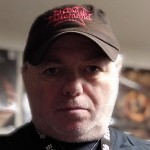










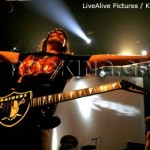

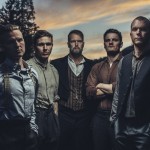


![[7+7]: Μουσικές στον κινηματογράφο, Vol. 2025](https://images.rocking.gr/cine/2026/150x150/movies2025-cover.jpg)
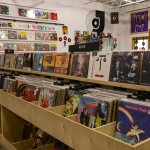



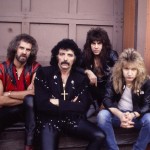

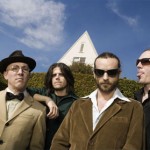

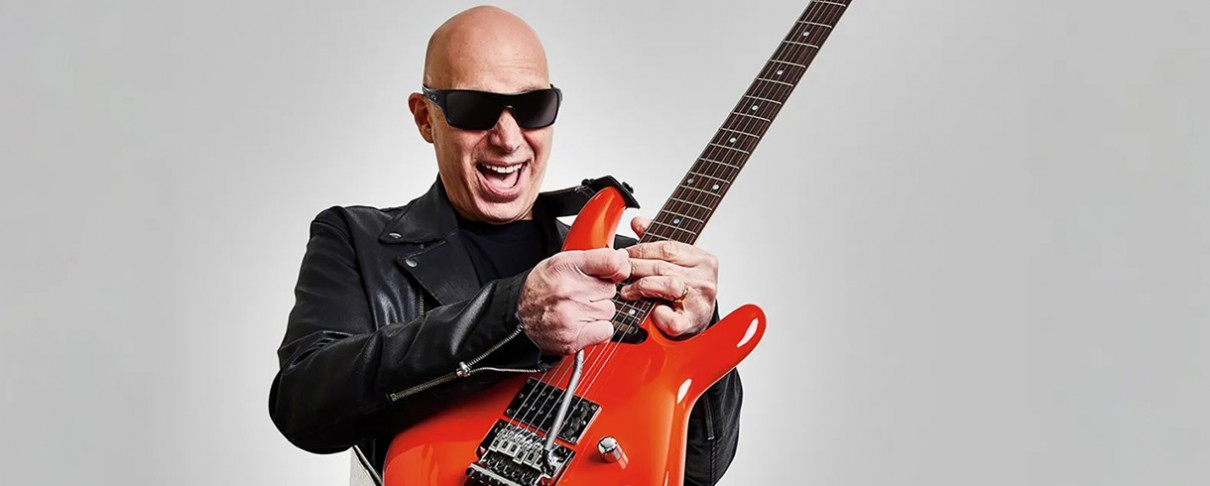

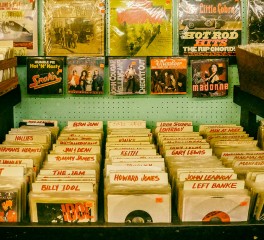

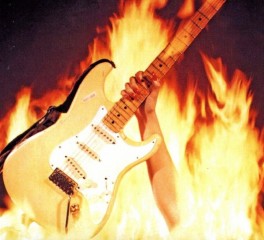








![[7+7]: Μουσικές στον κινηματογράφο, Vol. 2025](https://images.rocking.gr/cine/2026/250x230/movies2025-cover.jpg)

